
VOLUME 9, NUMBER 1 | November 2020

|
VOLUME 9, NUMBER 1 | November 2020 |
|
An e-newsletter from 
|
New Center on KTDRR Monograph Knowledge Translation: The Rise of Implementation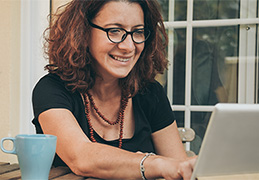
The Center on KTDRR is proud to share its monograph, Knowledge Translation: The Rise of Implementation. Lead author Melanie Barwick is an internationally recognized expert in knowledge translation (KT) and implementation science (IS). Raluca Dubrowski and Kadia Petricca complete the author team from the Hospital for Sick Children (SickKids) in Toronto, Ontario, Canada. The monograph provides an update of the KT literature and reflects on advancements in the KT process, as well as KT’s relationship with IS. KT practices related to disability research are highlighted, along with a look at future directions in KT.
HTML version: ktdrr.org/kt-implementation/
Download 508-compliant PDF file: |
Outreach to Policymakers Online Workshop, January 2021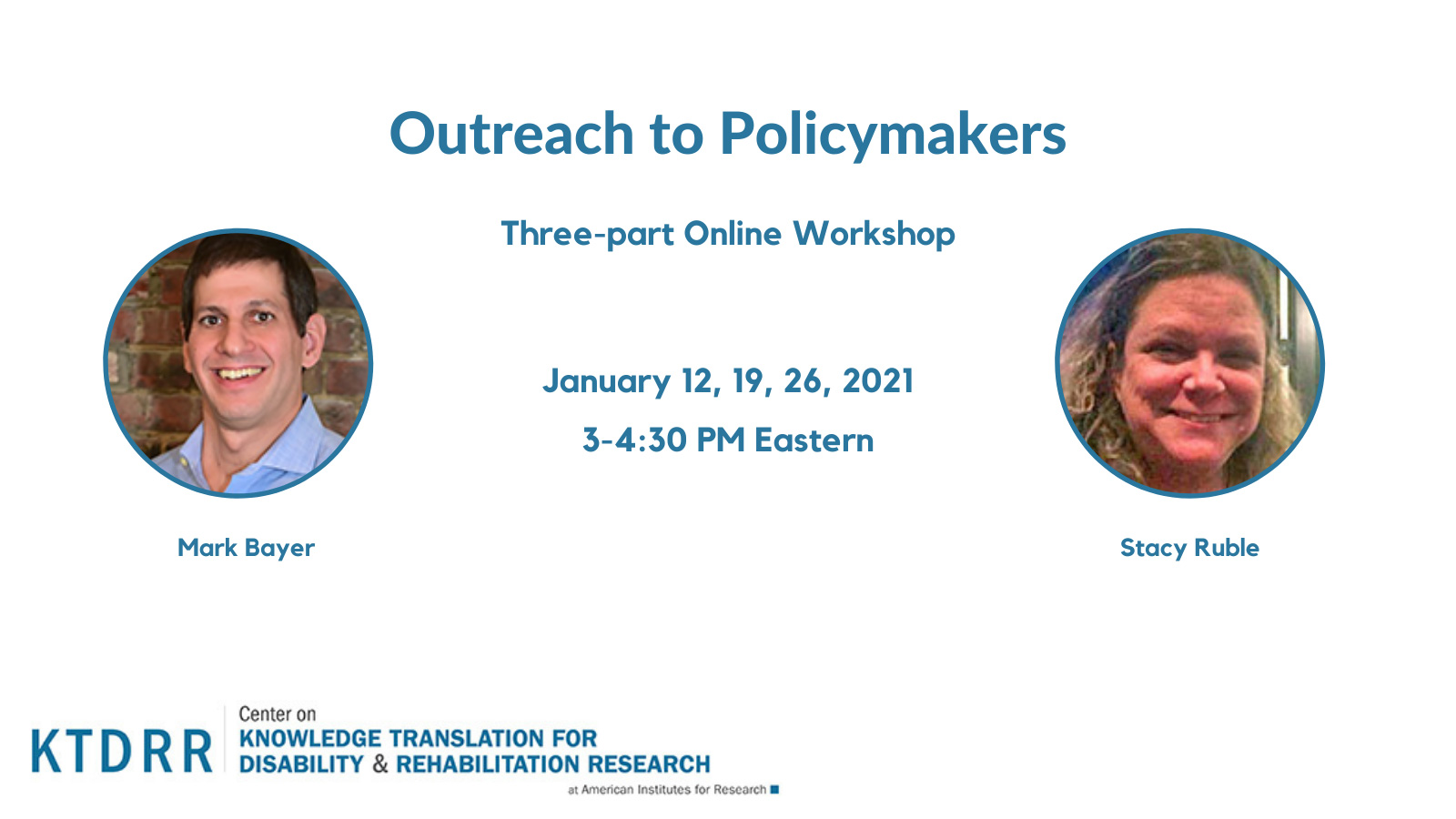
Curious about which strategies are best for sharing research information with state and national policymakers? Join other grantees of the National Institute on Disability, Independent Living and Rehabilitation Research (NIDILRR) for three afternoons this coming January to learn some new ways to reach out to federal and state policymakers to educate them about your work. You’ll have the chance to practice the strategies both online and offline and receive feedback from a pro.
Dates: January 12, 19, and 26, 2021 This workshop is designed for grantees funded by NIDILRR and other disability researchers. Nongrantees will be accepted as space permits (maximum 25 participants). For more information, visit ktdrr.org/training/workshops/2020outreach/. Register for KTDRR’s “Knowledge Translation Principles, Planning, Strategies, and Measurement” Training Course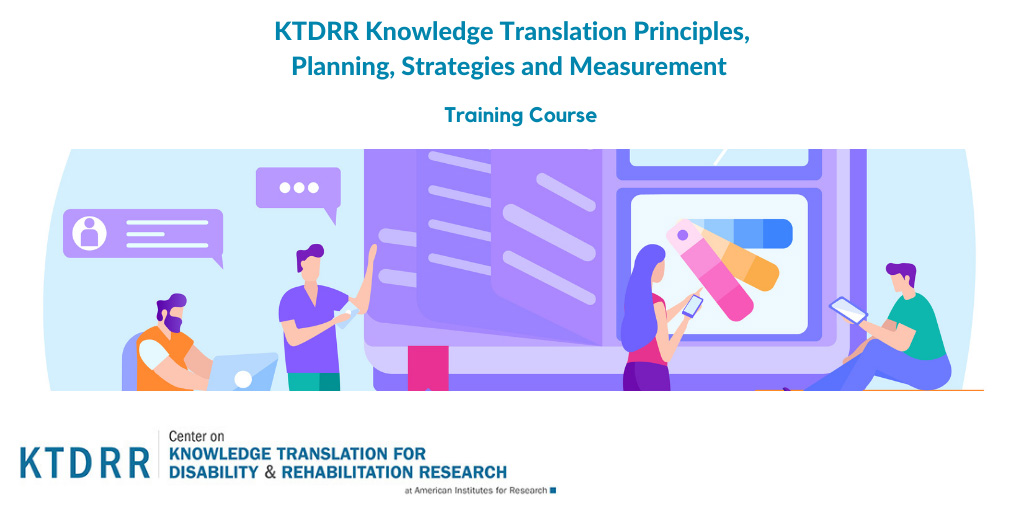
The Center on KTDRR is excited to bring a comprehensive, five-part training course on relevant knowledge translation (KT) topics to NIDILRR grantees. The learn-at-your-own-pace modules will promote the use of findings and products starting from a project’s planning phases through measuring its impact. The modules will be broken into the following topics:
The course is free and open to all NIDILRR grantees. Register now to receive updates on the training series. Webcast Archive—“How to Use Social Media to Enhance Research Impact: Step-by-Step Strategy to Grow Your Online Influence and Make a Bigger Impact”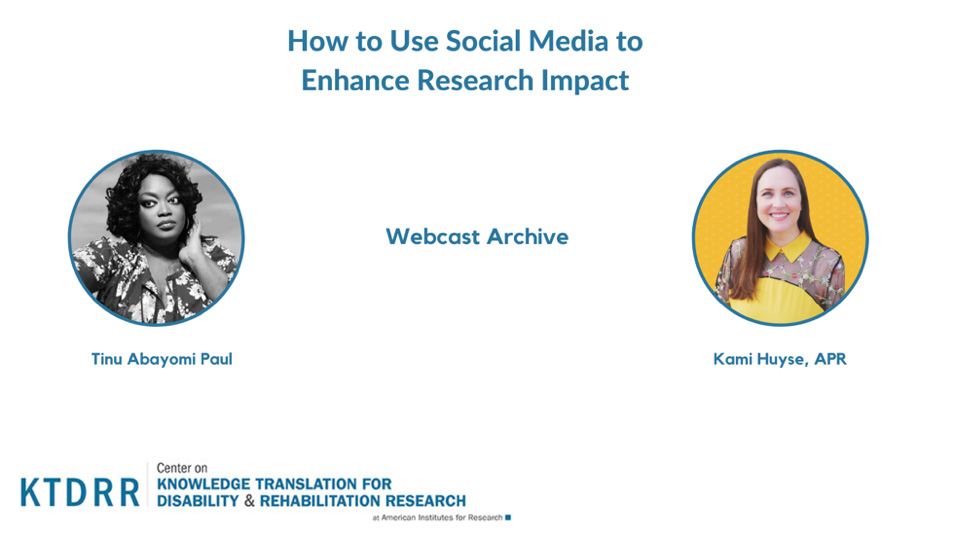
The Center on KTDRR’s latest webcast archive is now available. Tinu Abayomi Paul and Kami Huyse shared and described resources that can help build a robust following on social media for research findings, including members of the disability community. Our presenters offer attendees a 5-step approach to identify the ideal audience for your content, develop your voice on social media, determine how to know when your strategy is successful, take the first step, and improve your practice once established. For more information, visit ktdrr.org/training/webcasts/webcast74/index.html. New Edition of the Center on KTDRR’s KT Casebook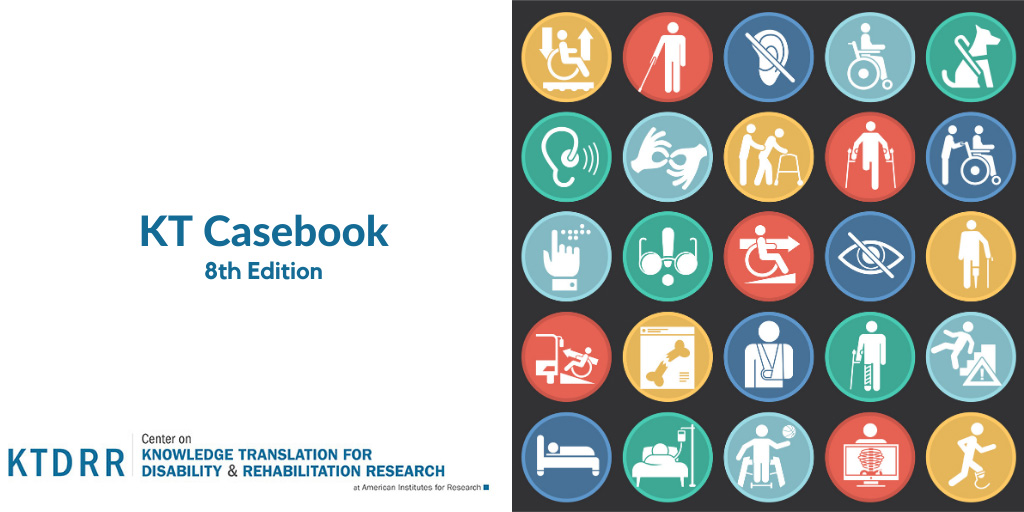
We're excited to announce the launch of the 8th edition of the KT Casebook! Take a look to see how NIDILRR grantees are using innovative, effective, and measured KT strategies to ensure their research is useful to their audiences.
Many thanks to those who submitted entries to this edition of the KT Casebook for an opportunity to showcase your KT activities. If you are part of a NIDILRR project, please consider submitting an entry for the 9th edition of the KT Casebook to Ann Outlaw, aoutlaw@air.org 2020 Online KT Conference Overview
The Center on KTDRR hosted its 8th annual online knowledge translation (KT) conference on October 26, 28, and 30, 2020, with the help of several presenters and lively reactors to help lead discussion of the conference presentations about this year’s theme: “Social Media Strategies for Knowledge Translation.” 2020 saw a record-breaking attendance of 421 participants hailing from 17 countries. Check out the Expo to download the presenter slides. To kick off the conference, NIDILRR’s Acting Director Kristi Hill, and the center’s project officer and NIDILRR Knowledge Translation Program Coordinator, Pimjai Sudsawad, welcomed the audience. The first day’s subtheme was “Start With the End in Mind: Using Social Media to Design Outcomes.” Katia Albanese and Hope Adler from Concepts Communication presented “How to Use Crowdsourcing and Social Media Tools to Engage Stakeholders.” They were followed by Christina Bard and Chithra Adams from the University of Kentucky’s Human Development Institute, who shared information about the “Use of Social Media Platforms for More Inclusive and Accessible Research Programs.” The second day’s subtheme was “Meet Them Where They’re At: Using Social Media for Subject Recruitment and Stakeholder Engagement.” Advarra’s Luke Gelinas highlighted concerns of particular relevance to institutional research review boards in “Social Media in Research: Navigating Ethical Issues.” Next, Heather Mannix from COMPASS offered innovative thinking about outreach in “Making Your Messages Stick: Thinking Differently About Communication Online.” The day finished up with a focus on “Social Media: Recruiting, Listening and Disseminating Knowledge,” a talk delivered by fellow NIDILRR grantees Jean Wnuk and Deirdre (“Dee”) Logan from the University of Massachusetts Medical School. The third and final day’s subtheme highlighted “Making a Difference With Social Media.” Katherine Inge of Virginia Commonwealth University summarized findings from a NIDILRR-funded study “Using Facebook to Impact the Knowledge of Evidence-Based Employment Practices by Individuals With Traumatic Brain Injury.” The last formal presentation of the week came from “across the pond” as attendees were joined by Andy Tattersall of the University of Sheffield, who offered several “Strategies for Creating an Effective Social Media Communications Campaign and Increasing Visibility.” The conference closed with a brief overview of the week’s themes in the context of the previous 7 years that Center on KTDRR Director Kathleen Murphy provided. And save the date for the 2021 Online KT Conference, taking place the week of October 25–29, 2021. We will be focused on using “Research Results for Policy Impact.” Center on KTDRR Training Lead Joann Starks Wins Campbell Collaboration’s John Westbrook Award
Joann Starks, American Institutes for Research (AIR) senior technical assistance consultant, training lead for AIR’s Center on KTDRR, and co-chair of the Campbell Collaboration’s Disability Coordinating Group, received the John Westbrook Award for Contributions to Knowledge Translation on October 28, during the What Works Global Summit. The award was established by a bequest from the estate of John Westbrook, who was the first leader of the Center on KTDRR, including its first iteration as the National Center on the Dissemination of Disability Research (NCDRR) in 1995. The award recognizes, consistent with the lifelong contributions John Westbrook made to the field, “outstanding contributions to knowledge translation and the dissemination and implementation of evidence” (see https://campbellcollaboration.org/news-and-events/awards/john-westbrook-award.html). Nominations are processed by the Campbell Collaboration’s Knowledge Translation and Implementation Coordinating Group, which is co-chaired by AIR Principal Technical Assistance Consultant Cindy Cai, director of several AIR projects, including the Model Systems Knowledge Translation Center, www.MSKTC.org. Campbell Collaboration senior leadership makes the final selection for the award. The Disability Coordinating Group activity is supported by AIR. |
|
Follow the Center on KTDRR on Facebook and Twitter for regular updates. Questions? Email Tracy Bauman at TBauman@air.org. |

|
|
The contents of this newsletter were developed under grant number 90DPKT0001 from the National Institute on Disability, Independent Living, and Rehabilitation Research (NIDILRR). NIDILRR is a Center within the Administration for Community Living (ACL), Department of Health and Human Services (HHS). The contents of this newsletter do not necessarily represent the policy of NIDILRR, ACL, HHS, and you should not assume endorsement by the Federal Government. Copyright © 2020 by American Institutes for Research |